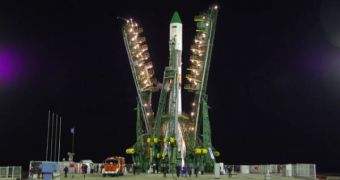The Progress M-02M cargo spacecraft, known by NASA under the designation Progress 33, docked on the Pirs docking module of the International Space Station (ISS) yesterday, May 12th, at about 3:24 pm EDT (1924 GMT). The freighter delivered a large amount of supplies to the orbital facility, including food, medication, and scientific equipment. Once everything is unloaded into the laboratory, the capsule will be filled with junk from the ISS, and then plunged head-first into the atmosphere, where it will burn and disintegrate.
The 3,384 pounds (1,520 kilograms) of cargo that Progress 33 brought onboard consist mainly of things such as spare parts, for the various devices on the station that have malfunctioned over time, life-support equipment, and new hardware for the various laboratories aboard the ISS. This was the 33rd such ferrying mission that Progress capsules took to the station within the last ten years. The docking took place some 218 miles (350 kilometers) in low Earth orbit, above the Mongolian-Chinese border. The guidance on approach was done automatically.
The space station is now occupied by the Expedition 19 crew, which is made up of Russian commander Gennedy Padalka, and flight engineers Michael Barratt (from the United States) and Koichi Wakata, the first long-term Japanese astronaut on the ISS. Throughout the approach sequence, Padalka was ready at all times to take manual control of the capsule, if the automated guidance system was to fail. “Everything is stable. The vehicle is moving steadily and stably, like a very important person,” he radioed to the Mission Control, while Progress 33 was nearing its docking port.
The resupply module also carries 1,918 pounds (870 kilograms) of propellant, which it will soon transfer to the Russian segment of the orbital lab. The fuel will power up the maneuver thrusters aboard the complex, which will ensure that the crew can move it out of the way, if microasteroids or pieces of space debris, flying at high speed, happen to threaten it. In addition, Progress 33 also carried 110 pounds (55 kilograms) of air and oxygen on the ISS, to augment existing reserves.
The new module, which replaced the recently deorbited Progress 32, was launched Thursday, May 7th, from the Baikonur Cosmodrome, in Kazakhstan. It was carried to orbit by a Russian Soyuz U booster, which ignited its engines at 2:37 pm EDT (1837 GMT), Space reports.

 14 DAY TRIAL //
14 DAY TRIAL //